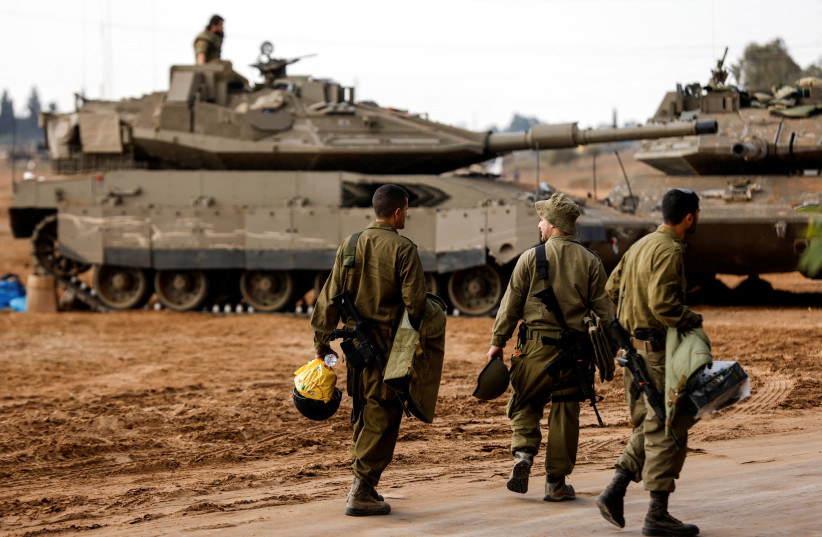I remember the fateful day in April of 2021 when I first saw The Jerusalem Post headline, “Disabled IDF veteran sets himself on fire outside Defense Ministry.” Like most Israelis, upon seeing such a story cross my newsfeed, I was distraught, confused, and furious. Itzik Saidian, we later learned, was a veteran of the 2014 Gaza war (Operation Protective Edge).
His experiences led him to seek recognition from the government for PTSD, yet this course of action fell far short of meeting his post-combat needs. However, while many others asked the question, “How could this happen?” I found myself confronted with an entirely different perspective. Itzik’s story resonated with me in an eerie, all-to-familiar, and rather terrifying way.
Like many young people who served in the IDF during 2014, I took part in Operation Protective Edge. As a sharpshooter in the 890th paratrooper battalion, I found myself stationed on the front lines shortly after my advanced training had ended.
With practically no combat experience, I was suddenly thrown into one of the most dangerous places on earth and spent nearly a month straight in Gaza. Within that short span, I managed to have a dozen near-death experiences, with plenty of other misadventures sprinkled in between.
Yet as jarring as the combat experience had been, the conclusion of said combat was just as abrupt. After a month in Gaza, our unit, along with the rest of the IDF, returned to Israel and concluded our mission.

Struggling through PTSD
For me, the end of combat didn’t bring a deluge of psychological evaluations and group discussions. Despite the immense psychological pressure and various traumas we had all experienced over the previous month, we were all left to our own devices when it came to coping with the “after.”
Before I knew it, our military services carried on, and to an extent, it seemed like the war had never even happened.
Sure, there were stories and memories, but we all had to keep pushing forward as life continued.
For me, this oversight in managing the post-war experience had profound consequences. I, like many others, carried on with military duties, pushing the memories and traumas aside. During the remainder of my service, there was never any real push or requirement to confront them. It wasn’t until the end of my active service in 2015 that the reality of these unaddressed experiences began to surface. The lack of immediate post-combat intervention exacerbated the emotional struggles I later faced, ultimately leading to a diagnosis of PTSD in 2018.
Looking back, there’s a haunting clarity to some of the simple tools I’d ignored that may have helped me back then. If only I’d known the power held by the humble act of journaling, for example. Capturing moments as they happen is an important way to comprehend your experiences. More importantly, though, it provides a means to process and own your story before it slips through your fingers, warped by time.
Speaking about your experiences is just as important.
Opening up about the reality of combat can feel like peeling back your own armor, but the act of sharing is its own kind of shield. It could be with comrades who nod in shared understanding, a professional who guides you through the tangled aftermath, or even loved ones who simply offer their presence. Each conversation is a step away from the common feelings of frustration and isolation.
However, including your family doesn’t mean expecting them to grasp the full scope of your experience. It’s about letting them share in your journey, even if it’s just to sit with you in the silence, to understand when you seem distant, or to offer support as you find your footing again. It’s about the small nods, the patient silences, and the space to just be as you digest and begin to truly come to terms with the full enormity of your experiences during the war.
And then there’s the power of routine. It might not sound like much, but the rhythm of daily life is a subtle force. It offers a framework when the world feels like it’s spinning – a familiar pattern that can guide you back to a sense of normalcy. For me, it was as straightforward as setting regular times for sleep and exercise and allowing the structure of my days to rebuild the predictability that war had stripped away.
The experiences of war are unique to each soldier, and the path to healing and integration into civilian life is equally individual. But one thing is certain: The journey doesn’t have to be navigated alone. Seeking help, talking about your experiences, and taking proactive steps towards mental wellness are signs of strength, not weakness. I speak from a position of hindsight, having learned all these coping mechanisms the hard way after the fact.
So, to my fellow soldiers, remember that your service extends beyond the battlefield. It’s also about taking care of yourself after the war and ensuring you come back not just physically but also mentally and emotionally whole. To the families and friends, your role is invaluable in providing the understanding and support that can make all the difference. Remember, you’re not alone in this journey. We are all in this together.
The writer is a former “lone soldier” and a paratroop corps. veteran who served in the Gaza war in 2014. He now works in hi-tech, living in central Israel with his wife and children.
